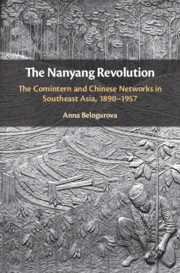Book contents
- The Nanyang Revolution
- The Nanyang Revolution
- Copyright page
- Contents
- Figures and Tables
- Acknowledgments
- Note on Transliteration
- Terms and Abbreviations
- Part I Revolution in the Nanyang
- Part II The Comintern, the MCP, and Chinese Networks, 1930–1935
- Part III The GMD, the MCP, and the Nation: Minzu Cultivated, Minzu Lost
- 6 Minzu Cultivated, 1928–1940
- 7 Language, Power, and the MCP’s Lost Nation, 1939–1940
- 8 Epilogue
- Selected Bibliography
- Index
7 - Language, Power, and the MCP’s Lost Nation, 1939–1940
from Part III - The GMD, the MCP, and the Nation: Minzu Cultivated, Minzu Lost
Published online by Cambridge University Press: 23 August 2019
- The Nanyang Revolution
- The Nanyang Revolution
- Copyright page
- Contents
- Figures and Tables
- Acknowledgments
- Note on Transliteration
- Terms and Abbreviations
- Part I Revolution in the Nanyang
- Part II The Comintern, the MCP, and Chinese Networks, 1930–1935
- Part III The GMD, the MCP, and the Nation: Minzu Cultivated, Minzu Lost
- 6 Minzu Cultivated, 1928–1940
- 7 Language, Power, and the MCP’s Lost Nation, 1939–1940
- 8 Epilogue
- Selected Bibliography
- Index
Summary
Due to its Chinese membership and its national status as the communist party of Malaya, the MCP embraced two national identities, Chinese and Malayan, and represented two nations. Bolshevik language both empowered and hindered the MCP as a Chinese association and as a communist party. By 1934, dictated by the MCP’s logic of survival as an overseas Chinese organization, the MCP started to practice United Front tactics. Over the course of the 1930s, the MCP was supported by some affluent members of the Chinese community, as the overseas bourgeoisie were concerned about a better government in China. Yet the radical antibourgeois and anti-British language of the MCP resulted in a loss of support among affluent members of the Chinese community on the eve of the war. The majority of the Chinese community was neither anti-British nor anticapitalistic. The Bolshevik concept of a proletarian nation and anti-British rhetoric hindered the MCP in its ability to attract a following and excluded the Chinese bourgeoisie as potential members of its communist party. At the same time, the Bolshevik language of the revolution helped to strengthen the MCP’s ambitions.
Keywords
- Type
- Chapter
- Information
- The Nanyang RevolutionThe Comintern and Chinese Networks in Southeast Asia, 1890–1957, pp. 189 - 223Publisher: Cambridge University PressPrint publication year: 2019

